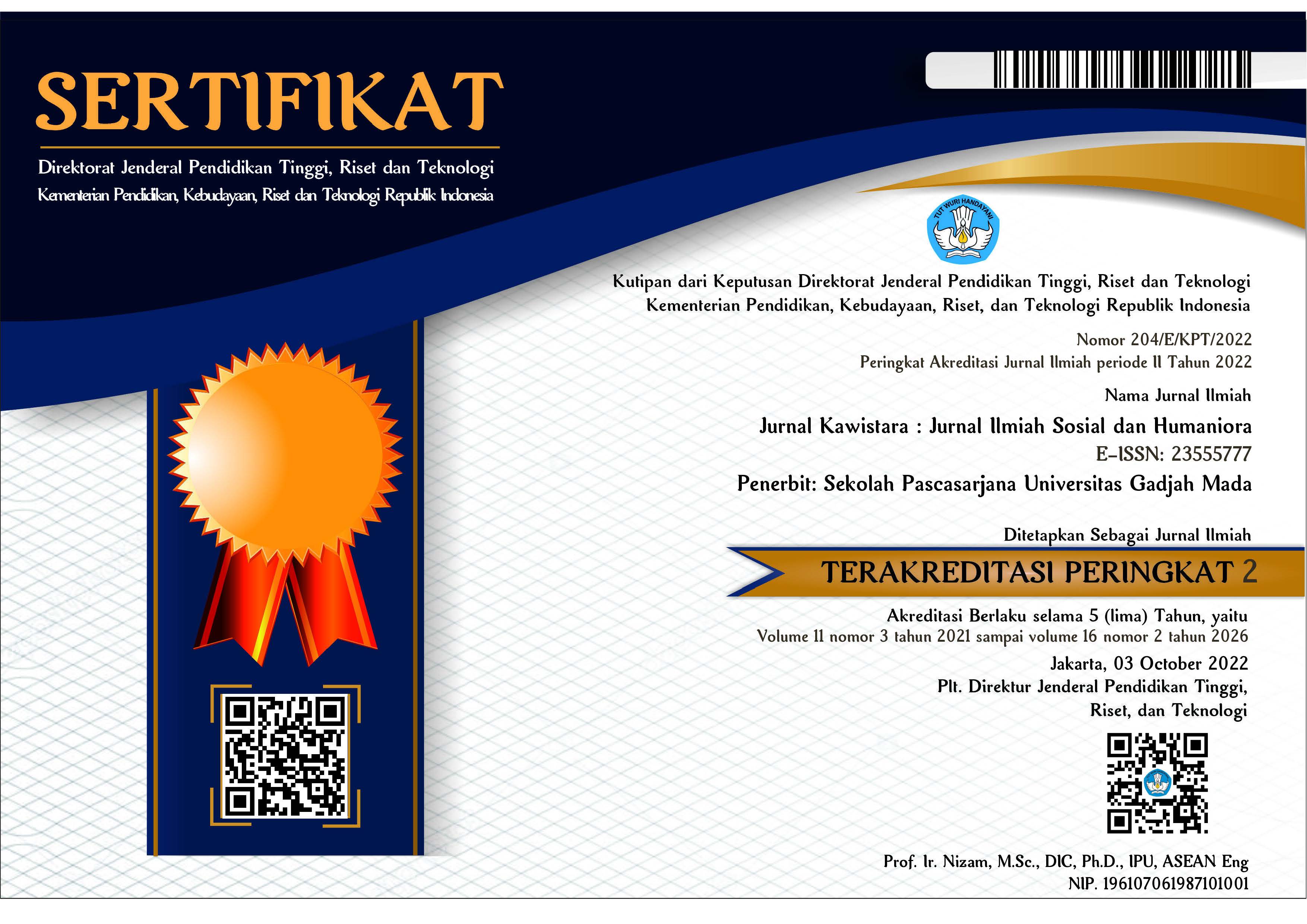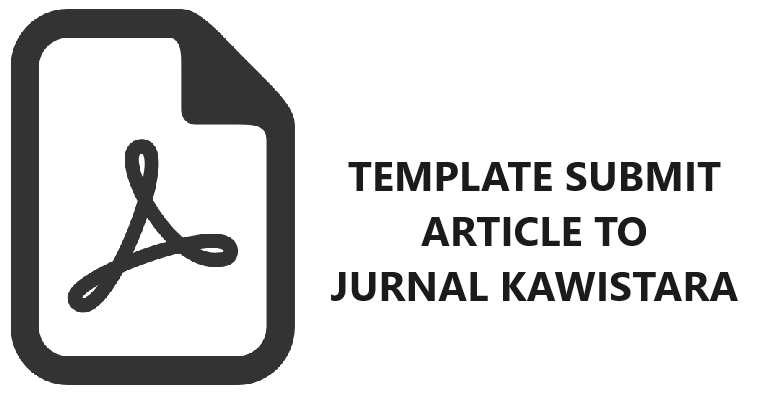ESTETIKA MASKULIN DAN EKSKLUSI PEREMPUAN DALAM FILM EKO-KRITIK SEORANG KAMBING (2016)
Ratna Noviani(1*)
(1) Prodi Kajian Budaya dan Media, Sekolah Pascasarjana, Universitas Gadjah Mada
(*) Corresponding Author
Abstract
The eco-critical film, Seorang Kambing (Tunggung Banjaransari, 2016), is part of eco-cinema, which mainly talks about problems of water crisis throughout its narrative. Eco-cinema has not only audio-visual presentations regarding environmental issues, but also functionalizes aesthetic choices, which could encourage viewers to have mindful and critical awareness of ecological problems. This article is aimed to examine how the film narrative of Seorang Kambing reproduces gender problems around the issue of water crisis. This article uses Stella Bruzzi’s (2013) concept of masculine aethetics in the cinema and the approach of eco-feminism, which critically reveals the connections between the oppressions of the nature and those toward women. By applying narrative analysis, which is presented by Helen Fulton (2005), this article reveals that masculine aethetics are functionalized predominantly in the film to narrate the problems of water crisis. Paradoxically, Seorang Kambing, as an intended eco-critical film, seems to simply overlook the significant roles of women around the issue of water crisis. In addition, the film reproduces the exclusion of women from the discourse of water crisis.
Keywords
Full Text:
PDFReferences
Alex, Rayson K. dan Deborah, S. Susan. 2016. “Introduction: The Ethics of Relationships in Social Documentaries.” Dalam Ecodocumentaries: Critical Essays, London: Palgrave Macmillan. Hal. 1-8
Brown, George R. 2006. “Transsexuals in the Military: Flight into Hypermasculinity.” Dalam The Transgender Reader. Diedit oleh Susan Styker dan Stephen Whittle, New York dan London: Routledge. Hal. 537-544
Bruzzi, Stella. 2013. Men’s Cinema: Masculinity and Mise en Scène in Hollywood, Edinburg: Edinburg University Press.
Candraningrum, Dewi. 2014. “Under Keningar Tree, the Bulls Drink No More: Myth of Mother Merapi”. Dalam Body Memories: Goddesses of Nusantara, Rings of Fire and Narratives of Myth, Salatiga: Yayasan Jurnal Perempuan dan PPSG UKSW. Hal 11-23
Digby, Tom. 2014. Love and War: How Militarism Shapes Sexuality and Romance, New York: Columbia University Press
Eaton, Heather dan Lorentzen, Lois Ann. 2003. “Introduction”. Dalam Eco-feminism and Globalization: Exploring Culture, Context and Religion. Oxford, UK: Rowman & Littlefield. Hal. 1-8
Fulton, Helen. 2005. “Film Narrative and Visual Cohesion”. Dalam Narrative and Media. Diedit oleh Helen Fulton, Rosemary Huisman, Julian Murphet dan Anne Dunn, Cambridge, United States: Cambridge University Press. Hal. 108-122
Ingram, David. 2013. “The Aesthetics and Ethics of Eco-Film Criticism”. Dalam Ecocinema Theory and Practice. Diedit oleh Stephen Rust, Salma Monani dan Sean Cubitt, London: Routledge. Hal 43-62
Kimmel, Michael dan Aronson, Amy. 2004. Men and Masculinities: A Social, Cultural and Historical Encyclopedia. Vol. 1: A—J, California, Colorado, Oxford: ABC Clio
Kompas.com. 2019. Jawa, Bali, dan Nusa Tenggara Terancam Krisis Air Bersih. Kompas.com. Diakses pada tanggal 26 Maret 2019 (https://properti.kompas.com/read/2019/03/26/192001621/jawa-bali-dan-nusa-tenggara-terancam-krisis-air-bersih)
MacDonald, Scott. 2013. “The Ecocinema Experience”. Dalam Ecocinema Theory and Practice. Diedit oleh Stephen Rust, Salma Monani dan Sean Cubitt, London: Routledge. Hal. 17-42
Media Indonesia. 2016. Krisis Air Bersih Ancaman Serius. Media Indonesia. Diakses pada tanggal 15 Agustus 2017. (http://mediaindonesia.com/news/read/34184/krisis-air-bersih-ancaman-serius/2016-03-15)
Mies, Maria dan Shiva, Vandana. 2014. “Introduction: Why We Wrote This Book Together”. Dalam Ecofeminism, London: Zed Books. Hal. 1-21
Neale, Steve. 1983. “Masculinity as Spectacle: Reflections on Men and Mainstream Cinema”. Screen 24(6): 2-16
Onn, Lee Poh dan Yia, Ng Boon. 2013. “Introduction”. Dalam Water Issues in Southeast Asia: Present Trends and Future Direction. Diedit oleh Lee Poh ON, Singapore: ISEAS. Hal. 1-26
Prakarti. 2016. Prakarti: Cerita Tentang Alam dan Kita. Prakarti. Diakses pada tanggal 15 Agustus 2017 (http://prakarti.id/tentang.html)
Rabiger, Michael. 2008. Directing Film Techniques and Aesthetics. Edisi Keempat. Oxford: Elsevier dan Focal Press
Republika.co.id. 2018. Pengambilan Air Tanah Secara Ilegal, Ini Komentar PAM Jaya. Republika.co.id. Diakses pada tanggal 27 Juli 2019. (https://www.republika.co.id/berita/nasional/jabodetabek-nasional/18/03/15/p5mvwj409-pengambilan-air-tanah-secara-ilegal-ini-komentar-pam-jaya)
Ruether, Rosemary Radford. 2001. “Deep Ecology, Ecofeminism and the Bible”. Dalam Deep Ecology of World Religions: New Essays on Sacred Ground. Diedit oleh David Landis Barnhill dan Roger S. Gottlieb, Albany, New York: State University of New York Press. Hal. 229-242
Rust, Stephen dan Monani, Salma. 2013. “Introduction: Cuts to Dissolves-Defining and Situating Ecocinema Studies”. Dalam Ecocinema Theory and Practice. Diedit oleh Stephen Rust, Salma Monani dan Sean Cubitt, London: Routledge. Hal. 1-14
Shiva, Vandana, 1988. Staying Alive: Women, Ecology and Survival in India, New Delhi: kali for women
______________, 2001. Water Wars: Privatization, Pollution and Profit, California: North Atlantic Book
Sim, Low Kwai dan Balamurugan, G. 1991. “Urbanization and Urban Water Poblems in Southeast Asia: A Case of Unsustainable Development.” Journal of Environmental Management, 32(3):195-209
Wallace, Tina dan Coles, Anne. 2005. “Gender, Water and Development: An Introduction”. Dalam Gender, Water and Development, Oxford and New York: Berg Publisher. Hal 1-20.
Willoquet-Maricondi, Paula. 2010. Framing the World: Explorations in Ecocriticism and Film, Virginia, United States: University of Virginia Press.
Article Metrics
Refbacks
- There are currently no refbacks.
Copyright (c) 2020 Ratna Noviani

This work is licensed under a Creative Commons Attribution-ShareAlike 4.0 International License.
Jurnal Kawistara is published by the Graduate School, Universitas Gadjah Mada.











